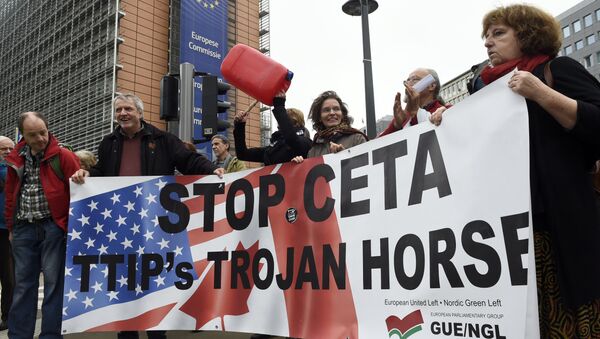BELGRADE (Sputnik), Victoria Mladenovich — On February 15, the European Parliament voted in favor of CETA ratification. However, national laws of half of the EU member states, including Croatia, allow for putting the deal to a vote in a referendum.
"We support a referendum on CETA in principle, but at the moment it is not very realistic that it will happen, nor would it be very useful as there is no real public or political debate on this issue in Croatia," the Green Action environmental group’s representative, Hrvoje Radovanovic, said.
The CETA agreement encountered difficulties last year when being ratified by Belgium due to opposition from the Walloon parliament. Belgium finally gave in and the deal was signed in late 2016. However, the European Commission, prompted by France and Germany, stated that the agreement would have to be ratified by all 28 EU member states.
"There is at the moment a cross-party consensus on CETA… This enthusiasm is, in our opinion, based more on wishful thinking about positive effects the deal will have on Croatian economy than on any concrete facts. A comprehensive analysis of the impacts on Croatian economy has not been made, but the fact that Canada is only a minor trading partner to Croatia (only 0,24% of our exports end up in Canada) casts serious doubts on politicians promises of significant benefits," Radovanovic warned.
In October 2016, the Croatian government at the time adopted the decision to support CETA at its final session, which sparked public protests in front of the government building.
"In regards to CETA, we hope adequate public debate in which engaged political and social actors participate would bring more light on benefits, but also on long-term negative effects," the executive director of non-governmental organization Gong, Jelena Berkovic, said.
According to her, legal framework for citizen-initiated referendum in Croatia "is one of the strictest in Europe," which is why the "likelihood for a successful initiative is extremely low."
She noted that Croatian citizens should nevertheless be informed about "the intricacies and details of the CETA agreement" as they could have "long-term negative effects on sustainable growth, rule of law, national sovereignty and food safety."
Despite still having to be ratified by all EU member states, the CETA deal can be provisionally applied from the start of April, according to the European Parliament.
CETA aims to establish a free trade zone between Canada and the European Union. It has been criticized over fears of undermining environmental protection, health and safety regulation and workers' rights.



